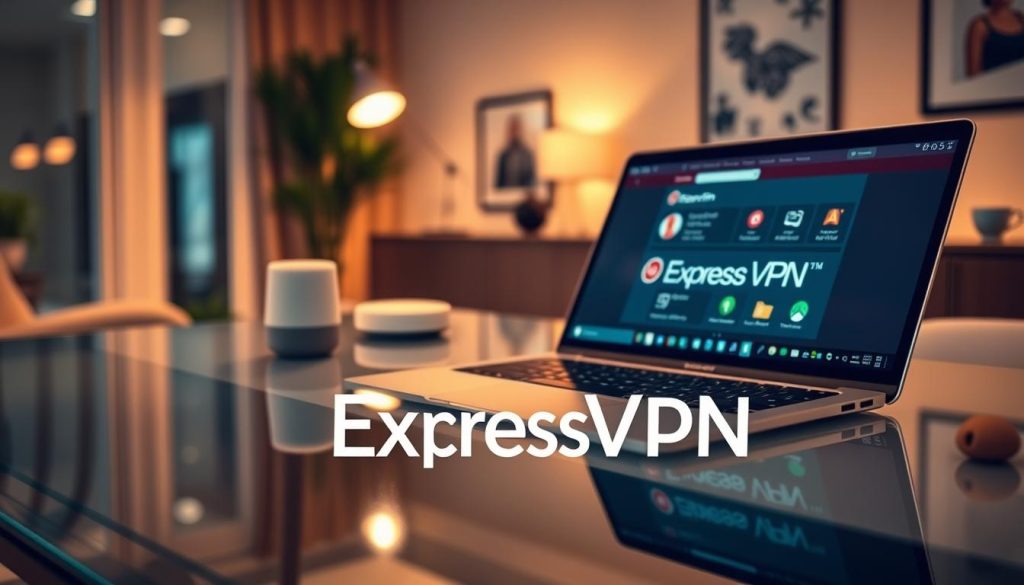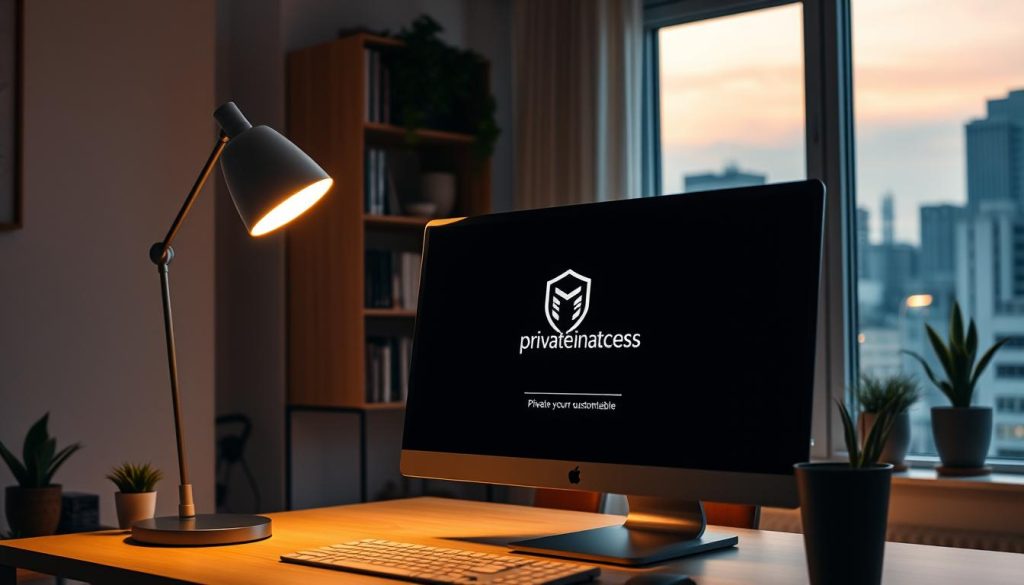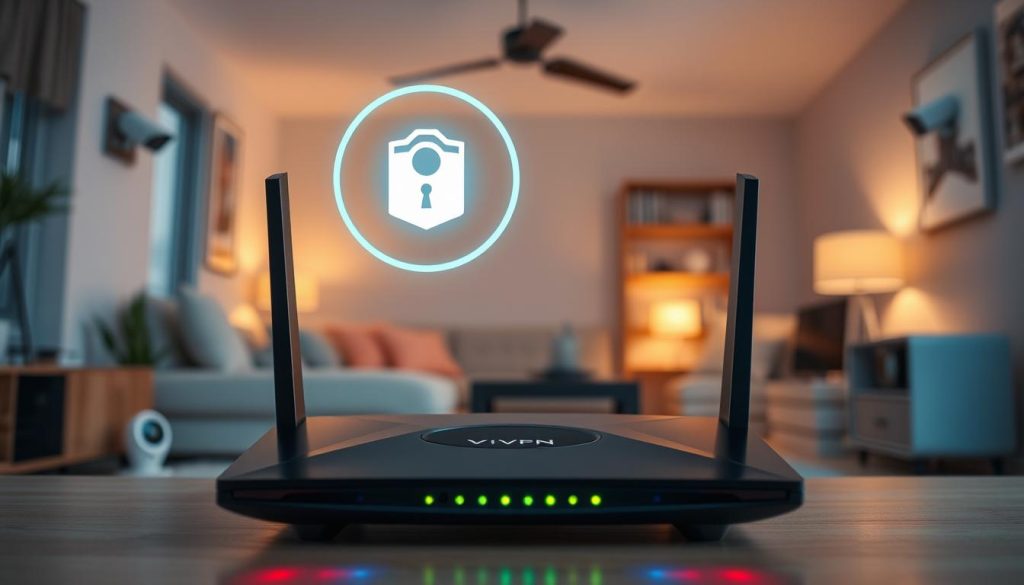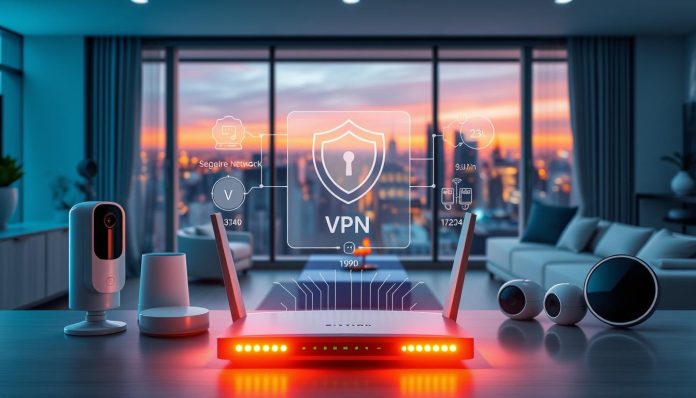You want a simple way to protect every gadget in your home network without slowing streaming or automation. This guide shows how top options balance privacy and security while keeping speeds high for 4K shows and daily tasks.
We compare trusted names like ExpressVPN, NordVPN, Surfshark, Proton VPN, Private Internet Access, and Hotspot Shield. Expect features such as audited no‑logs policies, RAM‑only servers, and modern protocols that resist attacks.
You’ll get clear notes on router‑level setup to protect gadgets that lack apps, and when to use device apps instead. The guide also covers kill switches, server coverage, refund windows, and practical tips for avoiding ISP throttling and geo blocks on the internet.
Read on to pick a solution that fits your routine and gives you confident access to fast, private connections across the whole home.
Why your smart home needs a VPN right now
Your home’s connected gear generates nonstop internet traffic that can reveal when you’re home, what you watch, and more. A vpn encrypts that traffic with strong ciphers like AES‑256 or ChaCha20, so ISPs and local snoops can’t read your data.
When you route devices through a vpn, your IP address is masked and activity is sent through remote servers. Reputable providers pair this with audited no‑logs policies so your browsing history isn’t stored by the service.
- Encrypted tunnels stop outsiders from inspecting camera, sensor, and speaker traffic.
- Masked addresses make it harder for trackers to map household habits.
- Router‑level setups protect many gadgets at once, including those without native apps.
- Features like a kill switch prevent leaks during brief disconnects.
The result is clearer privacy and fewer chances of ISP profiling or data correlation. That protective layer keeps your smart system smoother and less exposed to common IoT risks.
How to choose a smart‑home VPN: security, speed, and seamless access
Protecting a crowded home network means choosing a vpn that balances security, fast connections, and easy management. Focus on features that actually protect IoT traffic and keep latency low for streaming and automation.
Must-have security features for IoT
Insist on a working kill switch, DNS/IPv6/WebRTC leak protection, and modern encryption like AES‑256 or ChaCha20. Prefer providers with RAM‑only servers and independent audits to strengthen your household privacy.
Speed, servers, and unlimited connections
Check real-world speed tests. Top choices keep speed loss under 10% so 4K stays smooth. Wide server locations lower latency, and unlimited connections simplify setups for many cameras, TVs, and phones.
Router compatibility, apps, and support
Pick vpns with clear router guides, mesh support, and user-friendly apps. Fast protocols like WireGuard/NordLynx or Lightway help devices reconnect. Round‑the‑clock chat is helpful when you tweak router firmware or Smart DNS.
| Feature | Why it matters | What to look for | Example providers |
|---|---|---|---|
| Kill switch & leak protection | Prevents data leaks during disconnects | Reliable system-wide kill switch, DNS/IPv6/WebRTC checks | NordVPN, ExpressVPN |
| Encryption & audits | Keeps IoT traffic unreadable | AES‑256/ChaCha20, RAM‑only servers, independent audits | Proton VPN, NordVPN |
| Speed & protocols | Maintains streaming and response times | WireGuard/NordLynx or Lightway; low speed loss in tests | ExpressVPN, NordVPN |
| Connections & router support | Protects many devices without per-device setup | Unlimited device policy, router guides, mesh compatibility | Surfshark, Private Internet Access |
Best VPN Services for Smart Homes in 2025
Choose a solution that fits your gadgets, budget, and appetite for setup and tuning. Below are top picks and quick guidance so you can match strengths to real needs like streaming, cameras, and gaming.
Top picks at a glance
- ExpressVPN — strong security, easy apps, great for busy households.
- NordVPN — fastest connections and Threat Protection Pro to block malware.
- Proton VPN — privacy-first with Secure Core and a solid free plan.
- Surfshark — budget-friendly with unlimited devices for whole-home coverage.
- Private Internet Access — deep customization and proven no‑logs.
- Hotspot Shield — very fast downloads via Hydra and free-friendly options.
Which one fits your devices, streaming needs, and price sensitivity
Match server options and protocols to your use: nearby servers for low latency, distant ones for content access. If you want hands-off setup, prefer providers with router guides and Smart DNS so streaming stays reliable.
| Provider | Strength | Best use |
|---|---|---|
| ExpressVPN | Security & ease | Mixed devices & 4K streaming |
| NordVPN | Speed & suite | Gaming and secure downloads |
| Proton VPN | Privacy & free plan | Privacy-conscious households |
ExpressVPN: rock-solid security and effortless apps for every device
For households that want hands-off protection and steady speeds, ExpressVPN combines simple apps with hardened security. You get quick connections, broad server locations, and 24/7 support to keep your devices online and private.

Security features you’ll use: ExpressVPN runs Lightway with obfuscation-by-default and a RAM-only TrustedServer setup. Independent audits by PwC and KPMG back its no-logs claims.
- Encryption: AES-256 with 4096-bit RSA, PFS, and quantum-resistant layers for future-proof protection.
- Instant connections: Lightway gives fast handshakes and stable roaming across Wi‑Fi and mesh networks.
- Support: 24/7 live chat helps with router installs, Smart DNS, and regional access issues.
| Metric | What to expect | Why it matters |
|---|---|---|
| Speed | ~898 Mbps on a 1 Gb line | Sustains 4K streaming and responsive smart controls |
| Servers & locations | Wide global coverage | Pick nearby endpoints for low latency or distant ones for content access |
| Money-back guarantee | 30-day trial | Try the service risk-free |
The interface is straightforward across phones, TVs, and routers, so setup is fast. If you want dependable performance with minimal tweaking, ExpressVPN is a strong choice that balances privacy, security, and speed for whole-home access.
NordVPN: all‑in‑one privacy suite with top speeds and device security
Nord packs fast protocols and layered protections to keep your home network responsive and private. You get NordLynx (WireGuard) with ChaCha20 encryption, plus tools that guard devices even when the VPN is off.
Privacy and protection
NordLynx gives quick handshakes and consistent speeds for multiple smart TVs and hubs. Threat Protection Pro blocks malicious downloads at the device level, and Double VPN routes traffic through two servers when you need extra anonymity.
Independent audits (Deloitte) reinforce its no‑logs claims, so your household traffic is less likely to be stored or linked to you.
Speed tests and coverage
In real tests Nord shows 950+ Mbps on high‑bandwidth lines with about a 5–6% download speed loss. That minimal impact keeps 4K streaming smooth and large updates moving fast.
With over 8,000 servers across 120+ countries, you’ll find nearby endpoints for low latency or distant servers for content access.
Why it fits busy homes
Apps make quick connects and let you pick optimal servers. That balance of simple controls and advanced options helps you manage security without breaking your routine.
| Feature | Why it matters | Notes |
|---|---|---|
| Protocols | Low latency and modern encryption | NordLynx (WireGuard) + ChaCha20 |
| Privacy tools | Extra device protection and routing | Threat Protection Pro, Double VPN |
| Coverage & refunds | Global access and trial period | 8,000+ servers in 120+ countries; 30‑day refund |
Plans scale from basic to feature-rich bundles. Per month pricing drops with longer terms, and the 30‑day refund lets you test performance with your smart devices risk‑free.
Proton VPN: privacy-first design with a standout free plan
If you value transparency and a strong free tier, Proton VPN gives privacy-focused tools built for cautious home networks.

The service routes traffic through Secure Core, sending your connection via hardened servers in privacy‑friendly countries before it exits. Open‑source apps and independent audits back up audited no‑logs claims, so your household data faces fewer unknowns.
With WireGuard and OpenVPN support, connections are stable and quick to reconnect when devices wake or roam. Full‑disk encryption on servers reduces risk if hardware is seized.
Speeds, streaming, and locations
Real tests show 950+ Mbps with about an 8% download loss. VPN Accelerator helps distant routes, improving speeds for 4K streaming and simultaneous device updates.
- Route via Secure Core for multi-hop protection.
- Use split tunneling and profiles to choose which devices go through the tunnel.
- The free plan offers unlimited bandwidth, making it a strong budget option.
| Feature | Why it matters | Notes |
|---|---|---|
| Secure Core | Extra hop through privacy‑friendly regions | Hardens exits across select countries |
| Open apps & audits | Transparency and verified no‑logs | Good for cautious households |
| Free plan | Budget-friendly basic protection | Unlimited bandwidth, limited locations |
If you prioritize transparency and strong defaults, Proton VPN fits a cautious home network that needs solid privacy and dependable performance.
Surfshark: best budget pick with unlimited connections for busy homes
If you need wide coverage without a steep per month bill, Surfshark packs unlimited device support into an affordable plan.
Surfshark gives you modern protocols (WireGuard, OpenVPN, IKEv2) and RAM‑only servers to keep connection states out of storage. That setup helps maintain fast, reliable speeds for streaming and background updates.
CleanWeb, Camouflage Mode, and Rotating IP
The built‑in CleanWeb blocks ads and many malicious domains, reducing clutter on smart TV interfaces and browser apps. Camouflage Mode masks vpn use on managed or restrictive networks.
Rotating IP cycles your address without changing location, adding an extra layer of anonymity during browsing sessions.
Smart‑home perks: unlimited devices and simple apps
Protect your whole household: unlimited connections mean phones, cameras, TVs, and IoT hubs run on one account. Simple apps and clear labels make setup fast whether you install an app on a device or use a router.
- WireGuard + RAM‑only servers for quick reconnections.
- Fast real‑world throughput (950+ Mbps) supports multiple 4K streams.
- Affordable long‑term pricing and a 30‑day refund to test coverage.
| Feature | What it does | Why it matters |
|---|---|---|
| CleanWeb | Blocks ads & malware domains | Cleaner TV/browser experience and fewer attack vectors |
| Camouflage Mode | Obfuscates vpn traffic | Works on restrictive Wi‑Fi in apartments or dorms |
| Rotating IP | Auto‑changes your IP periodically | Extra anonymity without reconnecting |
Private Internet Access: customizable protection and proven no‑logs
Private Internet Access puts control in your hands. You can tweak encryption, choose protocols, and balance speed versus security per device. That makes it flexible for cameras, hubs, and streaming boxes.

MACE ad/malware blocking, port forwarding, and open‑source apps
MACE blocks ad and malware domains at DNS level, which keeps smart TVs and browser UIs cleaner and safer. Port forwarding helps peer connections for certain apps and advanced setups.
Open‑source apps and independent audits support its audited no‑logs stance, backed by court cases that showed no retained user data.
Performance and jurisdiction: speeds, servers, and US‑based caveats
PIA offers a large network of servers so you can pick nearby endpoints for low latency. Speeds are strong for streaming and everyday use, though WireGuard peaks may trail a few rivals.
- Unlimited connections let you cover phones, TVs, and hubs on one account.
- Competitive pricing and deep settings make it good for power users and casual setups.
- As a US‑based provider, it counters jurisdiction concerns with audits and a court‑proven no‑logs record.
| Feature | Why it matters | Notes |
|---|---|---|
| MACE | Blocks ads/malware domains | Cleaner TV and safer browsing |
| Port forwarding | Improves peer connectivity | Helpful for P2P and advanced devices |
| Open apps & audits | Transparency and trust | Court cases upheld no‑logs claims |
Hotspot Shield: the fastest free-friendly option for basic smart‑home needs
Hotspot Shield focuses on raw download throughput. Its Hydra protocol delivers very low speed loss — about 3.17% in tests — which helps large downloads and 4K streaming feel quick on capable lines.
Security and privacy features include audited no‑logs, a private DNS, and protections against DNS, IPv6, and WebRTC leaks. That reduces exposure for cameras, TVs, and voice assistants.
Free plan trade‑offs vs premium
The free plan is useful for light, single‑screen setups. Premium tiers add more servers, location choices, and higher concurrent throughput for whole‑home coverage.
- Hydra is tuned for high throughput and low latency on downloads and streaming.
- Leak protections and independent audits boost everyday trust.
- Works on restrictive networks and offers a 45‑day refund on paid plans.
| Aspect | Strength | When to pick |
|---|---|---|
| Hydra protocol | Very low download loss (~3.17%) | Large downloads, single‑screen 4K streaming |
| Leak & privacy protections | Private DNS; DNS/IPv6/WebRTC defense | Homes with many IoT devices and simple threat needs |
| Plans & refunds | Free plan; 45‑day refund on paid | Try speed-first setup before committing |
Router-level VPN vs device apps: the best way to protect every smart device
Deciding whether to run a vpn on your router or on each device starts with which gadgets you need to protect at all times.
Router installs cover every gadget on your network without per‑device setup. That makes them ideal for cameras, legacy smart TVs, speakers, and other gear that lacks an app.
Device apps give you granular control. Use apps on phones, laptops, or games consoles to preserve top speeds and avoid routing high‑bandwidth traffic through an encrypted router link.

Smart DNS, split tunneling, and profiles to streamline streaming
Smart DNS is a lighter option for consoles and TVs that need region access but not full encryption. It keeps 4K streaming smooth while bypassing some geo restrictions.
Split tunneling lets you exclude specific apps from the tunnel. That preserves local streaming or gaming while protecting browsers and downloads.
- Create profiles so family members can switch modes fast: full tunnel, split for home streaming, or high‑privacy routes for sensitive tasks.
- Mesh systems may need special firmware or provider guides—check compatibility before you install.
- Keep auto‑connect on so tunnels restore quickly when devices wake or move between nodes.
| Approach | Strength | When to pick |
|---|---|---|
| Router‑level vpn | Covers all gadgets at once; great for cameras and legacy TVs | Homes with many IoT items that lack apps or individual support |
| Device app | Granular control and top speeds for latency‑sensitive gear | Primary screens, gaming consoles, phones, and laptops |
| Hybrid (router + apps) | Best balance: router protects IoT; apps protect main screens | Large homes where bandwidth and latency matter for some devices |
| Smart DNS / split tunneling | Streamlined access with minimal speed loss | Use when you need regional access and smooth 4K streaming |
Speed tests and streaming: getting smooth 4K on smart TVs and hubs
Picking a provider that keeps real-world speeds high matters more than any single headline number. Your streaming apps and hubs need steady throughput and low latency to avoid buffering and stutters during 4K playback.
What “fastest VPN” really means for your smart home
Speeds in lab tests (NordVPN, Proton VPN, Surfshark: 950+ Mbps; ExpressVPN: ~898 Mbps; Hotspot Shield: very low loss ~3.17%) show raw capability. But the fastest vpn for you is the one that keeps nearby server performance stable on your actual router and set‑top boxes.
Prefer providers that report under ~10% speed loss in independent tests. That margin usually keeps multiple 4K streams and background updates running without noticeable slowdowns.
Bypassing ISP throttling and geo‑blocks for top streaming apps
Encrypting traffic helps avoid ISP throttling of video streams. If a provider supports obfuscation, it can restore smooth playback on restrictive networks.
- Choose nearby servers for lower latency and consistent buffering on 4K apps.
- Use WireGuard or Lightway for fast reconnects after device sleep, which helps hubs and streaming sticks resume quickly.
- Use Smart DNS on TVs or consoles when you need region access but want minimal speed loss.
| What to test | Why it matters | Practical tip |
|---|---|---|
| Download throughput | Determines 4K and large update performance | Run speed tests on the device or router during peak hours |
| Latency | Affects live sports and responsive apps | Pick nearby locations to reduce ping |
| Stability under load | Keeps multiple TVs and hubs working together | Test simultaneous streams to mimic real use |
Keep a shortlist of working servers and test before events like live sports. If one server lags, switch cities in the same country. Schedule big downloads off‑peak so household traffic stays smooth.
Security features that matter: kill switch, encryption, and leak protection
Stop a single drop from exposing cameras or accounts. Focus on features that protect your traffic and keep encryption updated so devices stay private and usable.
Quantum‑resistant layers, AES‑256, and RAM‑only server tech
Strong encryption is the core of good home network security. Look for AES‑256, forward secrecy, and providers that add quantum‑resistant options where available.
Prefer services that run RAM‑only servers. That way no data is written to disk if hardware is seized or replaced.
Examples include providers that pair ChaCha20 over WireGuard or implement AES with PFS for balanced speed and protection.
DNS, IPv6, and WebRTC leak checks for peace of mind
Always enable the kill switch so a brief disconnect does not leak your real IP during a firmware update or stream.
- Run DNS and WebRTC leak tests regularly to confirm your IP and requests are masked.
- Use app settings to block LAN traffic when you need stricter isolation on a shared network.
- Prefer providers with third‑party audits and keep apps updated for the latest protections.
- Consider double‑hop routes when privacy outweighs speed for sensitive browsing.
| Feature | Why it matters | Quick action |
|---|---|---|
| Kill switch | Prevents accidental exposure | Turn it on system‑wide |
| RAM‑only servers | No persistent storage of logs | Choose audited providers |
| Leak protection | Keeps IP and requests private | Test DNS/WebRTC often |
Server locations and network size: why coverage affects your daily experience
A wide set of server locations changes how your devices respond and what content you can reach. More countries and cities raise the odds of a nearby endpoint with low load.
Choosing nearby servers for speed and distant ones for content access
Pick nearby servers to lower latency and keep voice assistants, cameras, and hubs feeling responsive. That helps with real‑time feeds and quick automations.
Distant servers give you access to region‑locked apps and streaming libraries when you travel or need a specific regional app. Rotate between local cities if one server gets congested during peak hours.
- Flexibility: More countries and cities mean you can find a fast route close to home.
- Latency: Nearby endpoints reduce lag for cameras and voice controls.
- Content access: Remote locations unlock regional services when needed.
- Redundancy: Try another city if a server underperforms.
- Capacity: Expansive networks usually handle busy evenings better.
| Provider | Why it helps | Typical use |
|---|---|---|
| NordVPN | Servers in 120+ countries | Travel and wide regional access |
| ExpressVPN | Broad global coverage | Find nearby endpoints for low latency |
| Large networks | Many cities per country | Swap servers to avoid congestion |
Pricing, per month value, and money‑back guarantees
Start by matching the features you need to the actual per month price, not just the promo tag. Compare long‑term deals, refunds, and extras so you know what you really pay over a year.
Budget vs premium: what you actually get for the price
Premium plans often include audited no‑logs, polished apps, and priority support. That can matter if you rely on stable router installs and many devices.
Long‑term plans drop the per month cost dramatically: NordVPN deals (~$3.09–$3.39 per month), Surfshark (~$1.99 per month), and PIA (~$2.03 per month) show how multi‑year terms cut ongoing spend.
- Money‑back guarantee: try 30–45 days (ExpressVPN 30, Hotspot Shield 45) to test with your set‑top boxes and cameras.
- Watch renewals: promo rates often rise after the first term.
- Value extras: ad/malware blocking or identity tools can save time and reduce troubleshooting.
Free plan vs best free: limits to watch before you commit
Free plans (Proton, Hotspot Shield) are useful for light use, but expect fewer locations, capped features, and slower support. Use a short paid trial if you want to stress test streaming and latency.
| Plan type | Typical per month | Refund window |
|---|---|---|
| Long‑term premium | $1.99–$3.39 | 30–45 days |
| Monthly / trial | Higher per month, flexible | 30–45 days |
| Free plan | $0 (limited features) | None / limited |
Privacy policies and audits: understanding “no‑logs” claims
Not all no‑logs promises are equal. Read the privacy policy to see what connection metadata a provider may keep and for how long. Policies tell you whether your IP address, timestamps, or session totals could be recorded.
Third‑party audits and open code help verify claims. ExpressVPN had its no‑logs approach reviewed by PwC and KPMG. NordVPN has repeated audits from Deloitte. Hotspot Shield published an audit in 2023. Proton’s apps are open‑source and audited, and PIA’s no‑logs record has stood up in court.
What to check before you trust a provider
- Audit reports: Prefer providers that publish results and repeat reviews over time.
- RAM‑only servers: These wipe data on reboot and reduce persistence risk.
- Open‑source apps: Community review adds transparency to code and behavior.
- Private DNS: Keeps queries inside the tunnel and limits external exposure.
| Proof | Why it matters | Real example |
|---|---|---|
| Third‑party audit | Validates logging claims | NordVPN (Deloitte), ExpressVPN (PwC/KPMG) |
| Court history | Shows real‑world results | PIA’s no‑logs upheld in legal cases |
| RAM‑only server design | Prevents data on disk | Many top providers use RAM‑only servers |
Combine technical controls with transparency. Strong encryption and secure servers matter, but the written policy and independent verification tell you whether your traffic or address could ever be exposed. That layered approach reduces the risk that your data is revealed in extraordinary circumstances.
Our testing approach for smart‑home VPNs
To evaluate real home performance, we reproduced typical days of streaming, updates, and IoT chatter. You get practical results that reflect how a vpn behaves under load and during routine use.
We ran more than 30 criteria across security, privacy, speed, usability, and value. Tests cover leak checks, kill switch reliability, encryption defaults, and connection recovery after sleep.
Security, privacy, speed, usability, and real‑home scenarios
Security and privacy: we validate kill switches, DNS/IPv6/WebRTC leak protection, and server setups to confirm data is not exposed.
Speed testing: we measure nearby and distant servers to reflect real streaming and multi‑device activity. That shows how speeds change with location and load.
Usability: we check app setup flow, quick‑connect accuracy, and how fast apps reconnect when devices move or wake.
Devices used: Windows, macOS, Android, iOS, Linux, smart TVs, and routers
Our lab uses Windows, macOS, Android, iOS, and Linux systems plus smart TVs and common router firmware. Router and mesh scenarios test many devices at once to mirror busy homes.
- Streaming trials measure 4K stability, live events, and how quickly alternate servers fix app issues.
- Router and mesh tests evaluate performance under constant IoT chatter and simultaneous streams.
- We run DNS/IPv6/WebRTC leak tests on each platform to confirm protection across devices.
- Value maps features, support, and pricing to everyday home use so you can match services to needs.
| Category | What we test | Why it matters |
|---|---|---|
| Security & privacy | Kill switch, encryption defaults, leak checks | Prevents accidental exposure of cameras and accounts |
| Speed & stability | Nearby vs distant servers, simultaneous streams | Keeps 4K playback smooth and updates timely |
| Usability | App setup, reconnect time, router guides | Makes daily management simple for you |
Our findings guide the recommendations so you can pick a vpn that fits your network, devices, and streaming needs. The goal is clear: help you choose services that protect data without slowing your home down.
Conclusion
Finish your setup by testing which provider gives the right mix of privacy, speed, and device support on your own network.
ExpressVPN fits hands‑off households that want audited builds and simple apps. NordVPN stands out if you need top speeds and extra protections. Proton VPN suits privacy purists and offers a capable free option.
Surfshark covers many devices with great value, while Private Internet Access gives deep customization and a court‑proven no‑logs record. Hotspot Shield delivers the fastest downloads and a generous refund window.
Match your pick to your streaming habits, device count, and willingness to tweak settings. Use each provider’s money‑back guarantee to test real-world performance and confirm leak protection, kill switches, and modern encryption give the security and access you need.

